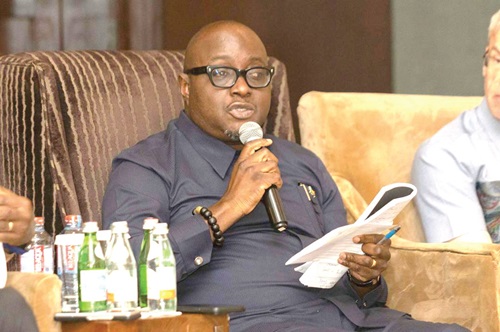The Chief Executive Officer of the Ghana Free Zones Authority (GFZA), Mike Oquaye Jnr, has underscored the importance of specialised economic zones (SEZs) in the development of the nation.
He said the impact of SEZs on industrialisation was multifaceted as they served as catalysts for infrastructural development, technology transfer and skills development. “By attracting multinational corporations, these zones become hubs for knowledge transfer.
Local firms and employees gain exposure to advanced technologies and industry best practices, enhancing their productivity and competitiveness,” Mr Oquaye said at a national policy forum on special economic zones in Accra.
He was speaking on the topic: Special economic zones: A force for industrialisation? The policy forum was attended by a wide array of personalities, including the President of the Association of Ghana Industries (AGI), Dr Humphrey Ayim-Darke, who also chaired the event; officials of the Ministry of Trade and Industry, the Dean of Graduate Studies of the University of Ghana, Prof. Robert Darko Osei, and faculty members, and the Institute of Statistical Social and Economic Research (ISSER), as well as faculty members of the University of Kiel, Germany.
There were also officials from the GFZA, the Association of Free Zones Enterprises and captains of industry. Mr Oquaye, whose presentation answered the topic in the affirmative, added that SEZs also played a pivotal role in diversifying the industrial base, encouraging the establishment of diverse industries from manufacturing and processing to services and logistics.
Processing zones
Currently, the country operates 7,337 acres of Export Processing Zones and Special Economic Zones (SEZ). They are the Tema Export Processing Zone (TEPZ) with 1,200 acres; the Sekondi Industrial Park, spanning 2,200 acres; the Ashanti Technology Park covering 1,099 acres; the Yabiw/Shama Land Bank with 1,600 acres, and the Afienya Special Economic Zone, occupying 1,238.38 acres.
Mr Oquaye said enterprises operating under the GFZs directly employed 29,567 people in 2020, and by 2023, the number increased to 35,399, an increase of 5,832 jobs or 19.7 per cent.
“This growth illustrates the zones' significant contribution to employment and livelihood support. These companies additionally generate nearly 500,000 indirect jobs,” he added.
Capital investment in SEZs also increased from $114.62 million in 2020 to $143.24 million in 2023, the CEO said, stressing that in spite of the dip in 2022 as a result of COVID-19, the overall upward trend reflected strong investor confidence in the country’s economic zones.
The Ghana Free Zones data suggests that 258 companies are now operating as free zone enterprises, an increase from 166 companies in 2021.
Companies
He said the 258 companies include 94 wholly Ghanaian-owned enterprises, 82 wholly foreign-owned, and 82 with a mixed share ownership structure, representing 36 per cent, 32 per cent, and 32 per cent respectively.
Mr Oquaye further said that SEZs were also important in the context of the African Continental Free Trade Area (AfCFTA). He said given that the authority had always advocated an export-led industrialisation since its creation in August 1995, “we are now channelling our full attention towards the comprehensive adoption of Special Economic Zones Policy”.
He added that the strategic shift was to fully leverage the manifold advantages offered by SEZs, transcending partial implementation focused on the Export Processing Zones (EPZ).
Under the country’s free zones policy, establishments can also operate as single factory businesses to set up their factories under stringent supervision anywhere in the country.

